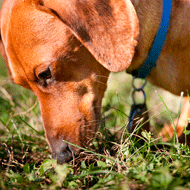Dogs 'rely on memory more than smell'

Memory may be more important than smell when dogs are trying to find a hidden treat.
Data from more than 500 dog owners around the world suggests memory may be more important than smell when dogs are trying to find a hidden treat.
Led by researchers from Duke University, the team wanted to find out whether data supplied by dog owners matched results from lab-based research. Their findings have been published in the journal PLOS ONE.
Dog owners who took part in the research played the same games at home that researchers use in the laboratory. In five of the seven tests analysed, data supplied by the dog owners corresponded closely with results produced in laboratories at Duke and elsewhere.
In one of the tests, for example, dogs watched as owners hid food under one of two cups. Then, when the dog's vision was obscured, the owner moved the treat to the other cup.
If the dogs relied on their sense of smell alone, they should still have been able to find the treat. However, researchers say most dogs went to the cup where they last saw the food, suggesting they relied more on memory than smell.
Evan MacLean, a senior research scientist at Duke, said this result has been replicated in seven different research groups and more than a dozen different studies.
"Most people think dogs use their sense of smell for everything," he said. "But actually dogs use a whole range of senses when solving problems."
Dog owners submitted the data through a website called Dognition. It was developed by Brian Hare, an associate professor of evolutionary anthropology at Duke. To date, more than 17,000 dog owners have signed up to share data with researchers.
"The data these dog owners are supplying is quality data," Evan MacLean said. "It matches the results we see coming out of the top research groups all over the world".
Professor Hare also founded Duke's Canine Cognition Center, which has a network of 1,000 dog owners who bring their pets into the lab to take part in research.
Analysis of the data also revealed that each dog uses a unique set of cognitive skills - some are good communicators, while others have better memories and some are better at taking their owner's perspective.
Prof Hare commented: "Most people think of intelligence as a glass that is more or less full. But intelligence is more like ice cream. Everybody has different flavours. Being good at one thing doesn't mean you will be good at everything else."
Read the full study: http://journals.plos.org/plosone/article?id=10.1371%2Fjournal.pone.0135176
To watch a Youtube video of the experimental protocol, visit: https://www.youtube.com/watch?v=toJZMfnc8ig



 RCVS Knowledge has welcomed Professor Peter Cockcroft as editor-in-chief for Veterinary Evidence.
RCVS Knowledge has welcomed Professor Peter Cockcroft as editor-in-chief for Veterinary Evidence.